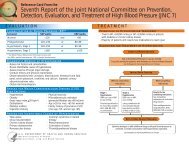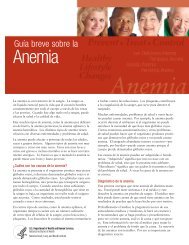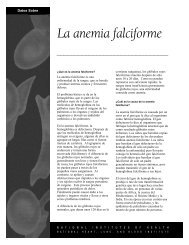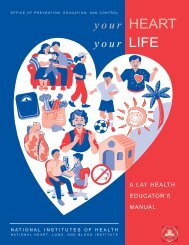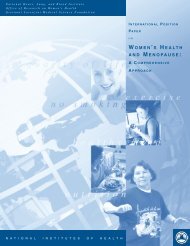HeartsNParks Community Mobilization Guide - National Heart, Lung ...
HeartsNParks Community Mobilization Guide - National Heart, Lung ...
HeartsNParks Community Mobilization Guide - National Heart, Lung ...
You also want an ePaper? Increase the reach of your titles
YUMPU automatically turns print PDFs into web optimized ePapers that Google loves.
R ISK F ACTORS F OR H EART D ISEASE<br />
High Blood Cholesterol<br />
High blood cholesterol plays an important part in deciding a person’s chance or risk of getting coronary<br />
heart disease. The higher your blood cholesterol, the greater your risk. When you have too much<br />
cholesterol in your blood, the excess builds up on the walls of the arteries that carry blood to the heart.<br />
This buildup is called “atherosclerosis,” or “hardening of the arteries.” It narrows the arteries and can<br />
slow down or block blood flow to the heart. With less blood, the heart gets less oxygen. Without enough<br />
oxygen to the heart, there may be chest pain (“angina” or “angina pectoris”), heart attack (“myocardial<br />
infarction”), or death. Cholesterol buildup is the most common cause of heart disease, but it happens<br />
so slowly that people are not aware of it. Blood cholesterol level is influenced by many factors.<br />
These include:<br />
■ Diet ■ Level of physical activity ■ Age<br />
■ Weight ■ Heredity ■ Gender<br />
High Blood Pressure<br />
High blood pressure, also called hypertension, is a risk factor for heart and kidney diseases and stroke.<br />
Blood is carried from the heart to all of the body’s tissues and organs in vessels called arteries. Blood<br />
pressure is the force of the blood pushing against the walls of arteries. Each time the heart beats (about<br />
60–70 times a minute at rest), it pumps blood into the arteries. Some people have blood pressure that<br />
stays high all or most of the time. Their blood pushes against the walls of their arteries with higher-thannormal<br />
force. If untreated, this can lead to serious medical problems like atherosclerosis, heart attack,<br />
enlarged heart, kidney damage, and stroke. High blood pressure is influenced by several<br />
factors. These include:<br />
■ Diet ■ Physical activity ■ Family history<br />
■ Weight ■ Alcohol consumption ■ Ethnicity<br />
Diabetes<br />
Diabetes is a disorder of metabolism—the way our bodies use digested food for growth and energy.<br />
Most of the food we eat is broken down into a simple sugar called glucose, which is the main source<br />
of fuel for the body. For the glucose to get into the body’s cells, insulin must be present. In people with<br />
diabetes the body produces little or no insulin, or the cells do not respond to the insulin that is produced.<br />
As a result, glucose builds up in the blood, overflows into the urine, and passes out of the<br />
body. Thus, the body loses its main source of fuel, even though the blood contains large amounts of<br />
glucose.<br />
Diabetes is widely recognized as one of the leading causes of death and disability in the<br />
United States. Diabetes is associated with long-term complications that affect almost every<br />
major organ of the body. It contributes to blindness, heart disease, strokes, kidney failure,<br />
amputations, and nerve damage. Diabetes is not contagious. People cannot catch it from each<br />
other. However, certain factors can increase one’s risk of developing diabetes. People at risk for<br />
diabetes include:<br />
■ Those with family members who have diabetes (especially type 2 diabetes)<br />
■ Those who are overweight<br />
■ Those who are African American, Hispanic, or Native American<br />
Overweight and Obesity<br />
Over the past four decades, the number of overweight children, adolescents, and adults has<br />
risen. In 1998, a little over one-half of all American adults (about 97 million) and one in five children<br />
over the age of 6 were considered overweight or obese, levels unmatched in our nation’s<br />
history. In 1995, the costs attributed to obesity alone amounted to an estimated $99 billion.<br />
5



